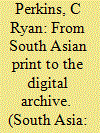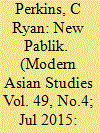|
|
|
Sort Order |
|
|
|
Items / Page
|
|
|
|
|
|
|
| Srl | Item |
| 1 |
ID:
172230


|
|
|
|
|
| Summary/Abstract |
This essay examines the challenges involving the creation of and access to digital content and those faced by smaller nineteenth-century publishers in South Asia. Rather than seeing the digital arena of online publishing as representing a break with preceding periods and technologies, this article argues that, as during the period of print’s expansion in colonial India towards the end of the nineteenth century, the digital arena is at its core an ongoing experiment in which legislation and regulations, readers, publishers, libraries, pirates and business interests continue to play off one another in a metaphorical dance through which the digital publishing landscape is created. For those in late colonial India who sought to enter the world of print and for contemporary efforts to make digitised materials available online alike, the quest for fiscal sustainability has been one of the greatest challenges. By combining an examination of the Urdu writer Abdul Ḥalīm Sharar’s (1860–1926) struggles in publishing the monthly periodical, Dil Gudāz, between 1887 and 1934 with the challenges faced by online archives today, this essay teases out parallels and differences. I argue that the ability of smaller presses to thrive in India in the late nineteenth and early twentieth centuries was dependent on a responsive public that accepted its newfound role as patrons, whereas in the present, private donations and grants are the crucial ingredients that can help ensure collaborations achieve their goals.
|
|
|
|
|
|
|
|
|
|
|
|
|
|
|
|
| 2 |
ID:
140292


|
|
|
|
|
| Summary/Abstract |
In the second half of the nineteenth century an increasing number of Indians entered the world of volunteerism and public activism. One such individual was the prolific Urdu writer Abdul Halim Sharar (1860–1926), who served as the secretary for a short-lived voluntary association, the Anjuman-e Dar-us-Salam, during the late 1880s in Lucknow, India. Using readers’ letters as printed in Sharar's widely circulating monthly periodical, Dil Gudāz, this article seeks to understand the reasons behind the increasing role of volunteerism as part and parcel of a modern sharīf Muslim identity in the post-1857 period. Having adopted the role of a community activist, Sharar began using his periodical, soon after its inception, to mobilize and recruit his readers to participate in what he described as a passionate movement sweeping through the ‘Islami pablik’. Both rhetorical and descriptive, such an idea provided hope for a divided and struggling community to overcome the divisions that were central to their many challenges in a post-1857 world. Through the study of the vicissitudes and challenges faced by Sharar and his fellow activists, this article underscores the ways in which public activism and volunteerism simultaneously represented the possibility for Muslims to use their own resources to bring about real social and political change, and also reminded them of their shortcomings and the limits of an informal activism. This article seeks to show that ultimately, even such ‘failed’ and ephemeral attempts were foundational for more effective mass mobilization efforts in the following decades and into the twentieth century.
|
|
|
|
|
|
|
|
|
|
|
|
|
|
|
|
|
|
|
|
|